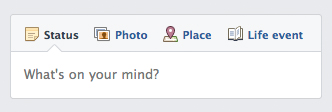90% of the world’s data has been created in the last two years
With so much data out there and so much more coming every day, are we fooling ourselves by thinking we still have control over our own, private information?
The word cloud is deceptive when it comes to technology, while it may sound light and fluffy in reality it describes a bunker-like room, owned by a company with computers processing data continuously. All of which is located in a particular country, subject to particular laws and requests for data. Such centres can also be the subject of digital assaults, although their owners will try and protect against this, plus there is the fact that all of this seemingly trivial detail that we reveal about ourselves online every day can be cross-referenced and correlated, often to startling effect.
A database of trivial detail is not a trivial database
Try it for yourself. Google your own name. You may find your Facebook profile or your Twitter feed appear.
From here you may find that you’ve recently updated a status that explains that you enjoyed a coffee round the corner from your home or visited a restaurant close to your work. Try Googling the name of that coffee house and you’ll quickly find the address. If you were to then search that town and your name you may find results for a company website registered in your name. Someone could then legally find out where the website is registered to (possibly your home address), your telephone number and your email address.
A quick glance on Facebook will inform them of who you are in a relationship with or married to, they will be able to view some of your photos, possibly, and read more about you as a person and the interaction you have with your friends and family.
Now, if they were to turn to your LinkedIn account they would be able to view your current work status, your work history, qualifications, skills and attributes, and also your hobbies.
By now you may be getting a sense that what someone can find out about you through a simple bit of Googling is more than you feel comfortable with or would want a potentially complete stranger to have access to.
According to research published this year even details as trivial as Facebook Likes can be analysed to predict with over 80% accuracy other private details, such as your ethnicity, political preference, religious beliefs and sexuality.
Despite all the risks, why are we so willing to document our lives online?
Perhaps we’ve been naïve, perhaps web historians of the future will laugh at us and our misguided faith we place on online websites and networking tools. But then again we could change, it’s never too late to change our ways - one of the great joys of technology is how easy it is to find out alternatives; from using anonymous browsers like Tour to private networks to manage your files. Or of course we could just stop telling everyone where we are going and who we are seeing instead.


















